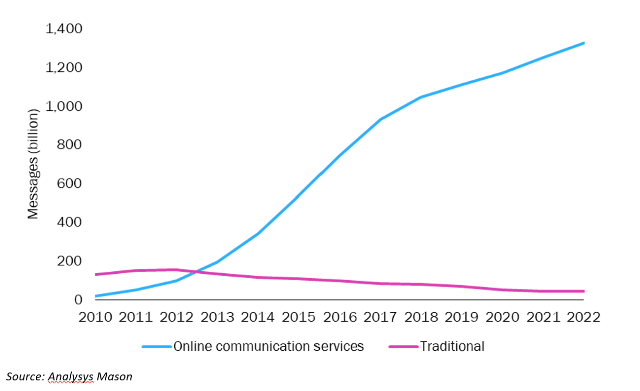The majority of UK adults would prefer to give up mobile phone calls for a day rather than sacrifice their favorite messaging apps, underscoring the growing significance of online communication services (OCS) in daily lives.
 As traditional telecoms services like text messages and phone calls wane in popularity, OCS platforms like WhatsApp and Snapchat have soared in importance, Ofcom said in its report.
As traditional telecoms services like text messages and phone calls wane in popularity, OCS platforms like WhatsApp and Snapchat have soared in importance, Ofcom said in its report.
According to Ofcom’s latest research, the number of text messages (SMS and MMS) sent in the UK plummeted from 151 billion in 2012 to just 36 billion in 2022. Meanwhile, online messages sent during the same period have surged from 100 billion to over 1.3 trillion, highlighting the remarkable shift towards digital messaging.
Mobile phone calls remain a popular means of staying connected with friends and family, with the amount of time spent making calls rising from 132 billion minutes in 2012 to 170 billion minutes in 2022. Still, only 26 percent of UK adults make a daily mobile phone call, and even fewer (23 percent) send a traditional text message daily. In stark contrast, two-thirds (67 percent) of individuals using an online communications service do so on a daily basis.
In a surprising revelation, approximately 58 percent of UK adults expressed a preference for going without mobile phone calls for 24 hours rather than forfeiting their beloved messaging apps.
The study also revealed that the average UK adult actively uses three different online communication services over a three-month period. WhatsApp takes the lead as the most commonly-used messaging app, with a staggering 76 percent of adults utilizing it in the past three months. Messenger follows at 18 percent, and iMessage at 6 percent.
Regarding the willingness to switch to different messaging apps, only one in ten respondents had changed their preferred app in the past year, with 51 percent of those citing popularity among their social circles as the reason.
Ofcom’s research further demonstrates that the preference for online communication services transcends age groups, with 81 percent of internet users over 65 and 76 percent of those over 55 using these services at least weekly.
From a competition and consumer protection perspective, Ofcom acknowledges the impact of larger platforms like WhatsApp and Meta’s online communication services, as they can act as a barrier to entry and expansion for newer or smaller platforms. However, the tendency among younger users to use multiple apps simultaneously mitigates this effect.
The study indicates positive outcomes for users and little evidence of significant harm from competition issues at this point. Nevertheless, the rapidly evolving features and monetization strategies of these platforms may influence competition in the future.
As for consumer protection, Ofcom identified risks associated with the misuse of messaging apps by scammers and the dissemination of illegal or harmful content. These concerns will be addressed under the forthcoming online safety regime, which is outside the scope of this research.
